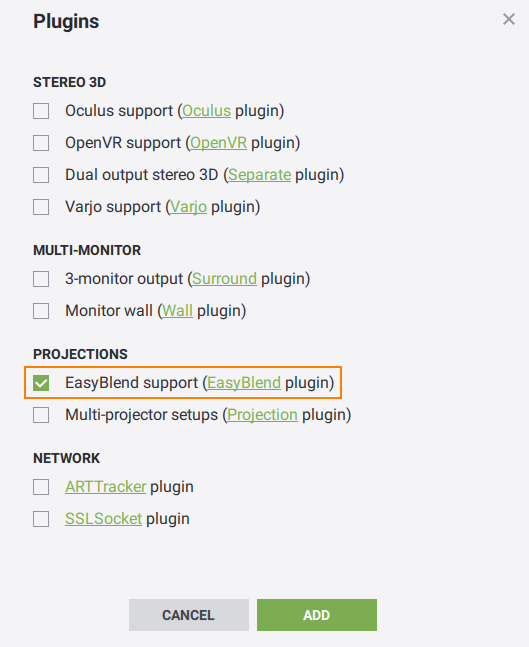Setting Up Projections with EasyBlend Plugin
You should upgrade to
EasyBlend plugin allows you to render the UNIGINE-based application on multi-projector setups that are stored in the calibration files created via Scalable Display Manager and set up via EasyBlend SDK. The setup can have a complex shape, such as dome.
The supported version is Scalable 7.0.
The plugin supports the fullwindow mode (when the application window is rendered without decorations).
You can toggle the EasyBlend plugin via the easyblend console command:
To enable, use:
Source codeeasyblend 1To disable, use:
Source codeeasyblend 0
See Also#
- EasyBlend Plugin API
Implementing Unigine Application with EasyBlend Support#
To use the EasyBlend plugin with UNIGINE, perform the following:
-
Create a new project with EasyBlend support via UNIGINE SDK Browser: click Plugins, check the EasyBlend support (EasyBlend plugin) option in the form that opens and click OK.
 EasyBlend Plugin on Plugins PanelNoticeTo add EasyBlend support to the existing project, in UNIGINE SDK Browser, click Other Actions -> Configure Project -> Plugins -> EasyBlend support (EasyBlend plugin) -> OK.
EasyBlend Plugin on Plugins PanelNoticeTo add EasyBlend support to the existing project, in UNIGINE SDK Browser, click Other Actions -> Configure Project -> Plugins -> EasyBlend support (EasyBlend plugin) -> OK. - Implement your application.
- Launch the EasyBlend plugin on the application start-up.
Launching EasyBlend#
To launch the plugin, specify the extern_plugin command line option on the application start-up as follows:
main_x64d -extern_plugin UnigineEasyBlend -calibration_file "my.ol" -video_mode -1 -video_width 1024 -video_height 768Here:
- calibration_file option specifies a path (absolute) to an *.ol calibration file that stores projection settings.
If you run the application via UNIGINE SDK Browser, specify the command-line options given above in the Customize Run Options form.
It is impossible to use EasyBlend with: